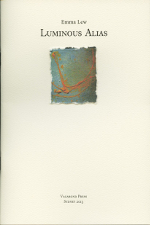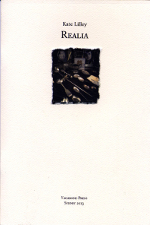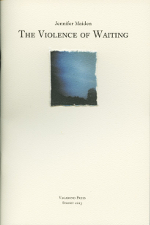



- Luminous Animals by Emma Lew
Vagabond Press, Rare Objects series, 2014
Maps, Cargo by Bella Li
Vagabond Press, Rare Objects series, 2014
Realia by Kate Lilley
Vagabond Press, Rare Objects series, 2014
The Violence of Waiting by Jennifer Maiden
Vagabond Press, Rare Objects series, 2014
Elegy intensifies around the objects that remain, those keepsakes that must signify a spent life. In Kate Lilley’s Realia, the first poem ‘GG’ is an auction listing from Greta Garbo’s estate in which the repetition of Garbo’s name intones like a docked requiem. Only things exist timeless, immutable, saleable, as shining representatives of the once-living. Life’s fraught event is reduced to its acquisitions, and transformed, satirised, into capitalism’s ultimate wearer of labels: the former consumer of commodities is now more amenably cast purely as a selection of those objects, whose value her absence increases. Lilley’s ‘realia’ hammer to the page like Luther’s Theses, each new item increasingly absurd, poignant, etiolated: ‘Greta Garbo bear metal figurine / Greta Garbo stamped Edelweiss doe skin gloves gauntlet length … Greta Garbo mechanical terrier … Greta Garbo wind-up puppy in pink basket … Greta Garbo roulette ashtray.’ The list loyally refrains from any enhancing or explanatory judgement. Each described object vainly attempts to serve as metonym, a distilled abbreviation of its once owner, an aide mémoire, an attribute, such as Athena’s aegis, or Hermes’s winged heels. Objects replace the person and the poem attempts its rite of transubstantiation, exposing this as futile bid.
The four poems of Realia are composed of carefully placed fragments, evoking, through sentiment they strategically evade yet imply, the unseen vanishing points of pathos and humour. Precise description memorialises: the ‘antler inkwell’ from Melbourne’s Trades Hall, in ‘Valet de Chambre’ signifying a past era, an obsolete trade; the ‘shaded o-mouth / painted sideglance … glad plaid’ of a doll from ‘Wax Composition 1926’ spins to life like Coppélia, with its sudden flush of present participles, or gerunds, ‘sleeping walking kissing’; ‘Plantation Dainty’ takes lines from Cajun and Creole slave songs, ‘les jours du temps passé’ (auld land syne), that stretch desire into death, as if yearning is always for obliteration:
She comes at night to croon me les jours du temps passé cream-top, picayune she’s what I want and her I’ll have lowers her face to mine when love’s chains upon thee lie buttons down her back as she goes bonsoir bonsoir mes beaux yeux noirs
Only the poem can remember, as objects stack these radiant caskets. The last poem, ‘Letters of Caption’ – a formal term meaning, roughly, to request to bring an offender of the church into line – wittily re-charges some common phrases in unpredictable contexts: ‘Presentation feedback: good to see you! … Brevity fabrication error … Cheek to cheek in the unabridged / Yours forthwith to thrall and bond.’
In Emma Lew’s Luminous Animals, each poem plays an irresolvable dramatis personae of pronouncements, justifications, and opinions, some seeming to address one who stands accused for unspecified reasons. The Other in these poems may be frightening, yet contemptible, as each narrator enacts a paradox of both revelation and withdrawal, embalming and erasing their own integrity:
Chaos persists and leads to inner haunting, spreading ruinously, as in dreams. So I’ll go on suffering with a kind of relish in the shadow of heroic virtues, until my errors of allegiance are forgotten or I fall into a brook one morning, very simple! (‘Speculative Realms’)
Some poems tally instructions that parody conventional roles:
You must try to touch his heart. Concoct a special soup in his honour. Laugh and cry and be afraid, and so on. (‘Mysteries and Lacquers’) It is bitterness I want to teach her ... Sweet dreams, delusive hopes. The taint is passed on from parent to child. How could anyone as pale as she, I wonder, sit so silently? I’ll never tire of punishing her. (‘Finishing School’)
These brusque explainers define their separateness with many end-stopped statements gathering around them like moats, yet they also wildly yield (The Wild Reply was Lew’s first book). The Other is alternately wooed and rejected as hoodwinked despot, witness, or invigilator, the narrator’s character always a flagrantly unknowable display, deflecting with spurious gambits. These narrations twist through self-analysis, repeating and dissolving, with any sense of agency brokered with qualifications and self-sabotaging contradictions, sometimes mirroring the doublespeak of so much twentieth century history:
I concluded in a very slow and clear manner,
so as to assist the person whose job it is to write everything down and
make a report,
“The death of the Red Army man should remain in our memories
all our lives as a lesson:
If the horse drowns,
proceed on foot.” (‘Lesson’)
There is an element of the Gothic in these minatory phrases, these haunted apologias of defiant resignation or offhanded incantation that are declaimed and yet, with almost Gothic camp, wryly toyed into discontinuous narrative. Another interest is season: two poems mention autumn, and three allude to spring, one locating it in May – the air is tinged with the upheavals of European history and literature, a fitting setting from which to parry the interpolations of shadowy off-stage quibblers.









